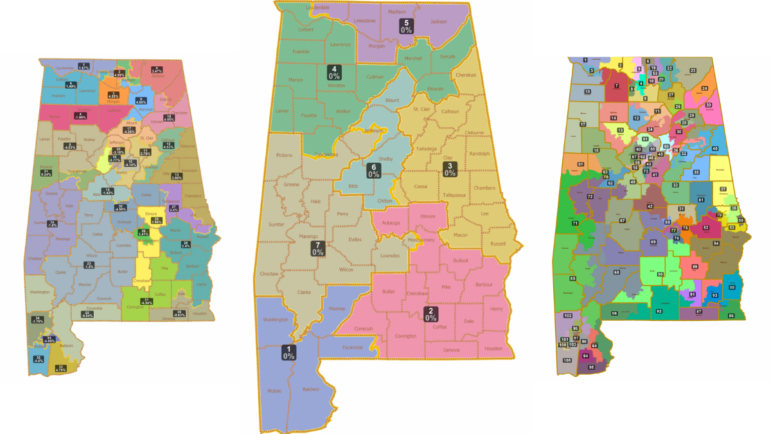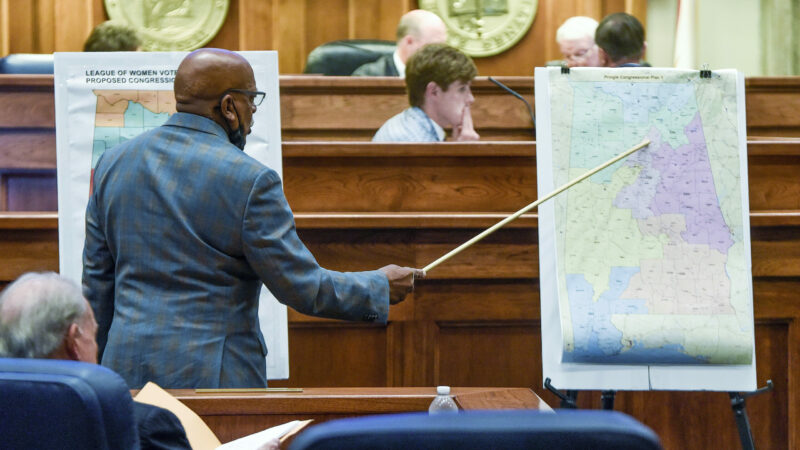Supreme Court lets Alabama use GOP-backed map of the state’s congressional districts
Sen. Rodger Smitherman compares U.S. Representative district maps during a special session on redistricting at the Alabama Statehouse in Montgomery, Ala., Nov. 3, 2021.
By Nina Totenberg, NPR
The U.S. Supreme Court further undercut the Voting Rights Act on Monday, blocking, for now, the creation of a second majority-Black congressional district in Alabama for the 2022 election.
The court’s action came on an emergency appeal from Alabama, which challenged a decision by a three-judge federal court panel that included two Trump appointees. The lower court concluded that under the Voting Rights Act, Alabama, a state with a population that is more than one-quarter Black, could reasonably, and therefore must, create two majority-Black districts out of seven congressional districts.
The Supreme Court vote was 5-4, with Chief Justice John Roberts joining the court’s three liberals in dissent. All four would have refused to intervene now, thus allowing the 2022 election to go forward with a map calling for two majority-Black districts. In contrast, the five-justice majority decision means that for at least another election cycle, Alabama will have just a single majority-Black congressional district, because the primaries are set to take place in May.
While the court has said that outright racial gerrymanders are unconstitutional, it has long interpreted the Voting Rights Act as requiring race to be a major factor in redistricting under certain circumstances — namely when white voters vote as a bloc against Black candidates and when a compact-enough majority-minority district or districts can be drawn so that minorities have a good chance to elect the candidates of their choice.
In the case from Alabama, the state doesn’t dispute that there is bloc voting. But it contests the creation of a second majority-Black district because it would divide the suburbs of Mobile. That argument was rejected by the lower court, which noted that the school districts in that area were divided in precisely the same way as the proposed second majority-Black congressional district.

But the Supreme Court stopped the lower court’s order from going into effect.
Alabama Attorney General Steve Marshall proclaimed victory for now, declaring that the creation of a single majority-Black district is all that the Constitution demands.
Needless to say, the Black plaintiffs were disappointed. Plaintiff Evan Milligan said in a statement on Monday: “We are disappointed by today’s decision. The fight for fair representation for Black voters in Alabama has been a winding road, generations long. However, during a month set aside to honor Black American history, we are reminded of the strength and dignity displayed by our ancestors who routinely confronted a wide variety of disappointments.”
Once again, the court’s action came in an unsigned order, without full briefing or argument, though the court will eventually hear arguments in the case, either later this term or, more likely, next fall.
“Accepting Alabama’s contentions would rewrite decades of this Court’s precedent” about the Voting Rights Act, wrote Justice Elena Kagan in a dissent joined by Justices Stephen Breyer and Sonia Sotomayor. “Here the district court applied established legal principles to an extensive evidentiary record. It’s reasoning was careful — indeed exhaustive — and justified in every respect,” and to do this on the court’s “shadow docket” without full briefing and argument first “does a disservice to Black Alabamians who … have had their electoral power diminished — in violation of a law this Court once knew to buttress all of American democracy.”
Chief Justice Roberts dissented separately, saying that because the lower court followed established precedents, he would not intervene to block the order. But he also suggested that the existing precedents are ambiguous and confusing, and he therefore voted to hear arguments on the wisdom of those precedents.
In a concurring opinion, Justice Brett Kavanaugh sought to justify the majority’s position, maintaining that the “stay order does not make or signal any change to voting rights law.”
Election law expert Rick Hasen, of the University of California, Irvine, however, saw the decision as telegraphing what “could be a radical reworking of the Voting Rights Act that would decrease minority representation, especially in the South.”
The court did not say when it will hear arguments in the case — and so the current GOP-drawn map, which has only one majority-minority district, will almost certainly remain in effect at least for the 2022 election and very likely beyond that as well.
Copyright 2022 NPR. To see more, visit https://www.npr.org.
Pentagon puts Scouts ‘on notice’ over DEI and girl-centered policies
After threatening to sever ties with the organization formerly known as the Boy Scouts, Defense Secretary Hegseth announced a 6-month reprieve
President Trump bans Anthropic from use in government systems
Trump called the AI lab a "RADICAL LEFT, WOKE COMPANY" in a social media post. The Pentagon also ordered all military contractors to stop doing business with Anthropic.
HUD proposes time limits and work requirements for rental aid
The rule would allow housing agencies and landlords to impose such requirements "to encourage self-sufficiency." Critics say most who can work already do, but their wages are low.
Paramount and Warner Bros’ deal is about merging studios, and a whole lot more
The nearly $111 billion marriage would unite Paramount and Warner film studios, streamers and television properties — including CNN — under the control of the wealthy Ellison family.
A new film follows Paul McCartney’s 2nd act after The Beatles’ breakup
While previous documentaries captured the frenzy of Beatlemania, Man on the Run focuses on McCartney in the years between the band's breakup and John Lennon's death.
An aspiring dancer. A wealthy benefactor. And ‘Dreams’ turned to nightmare
A new psychological drama from Mexican filmmaker Michel Franco centers on the torrid affair between a wealthy San Francisco philanthropist and an undocumented immigrant who aspires to be a dancer.







